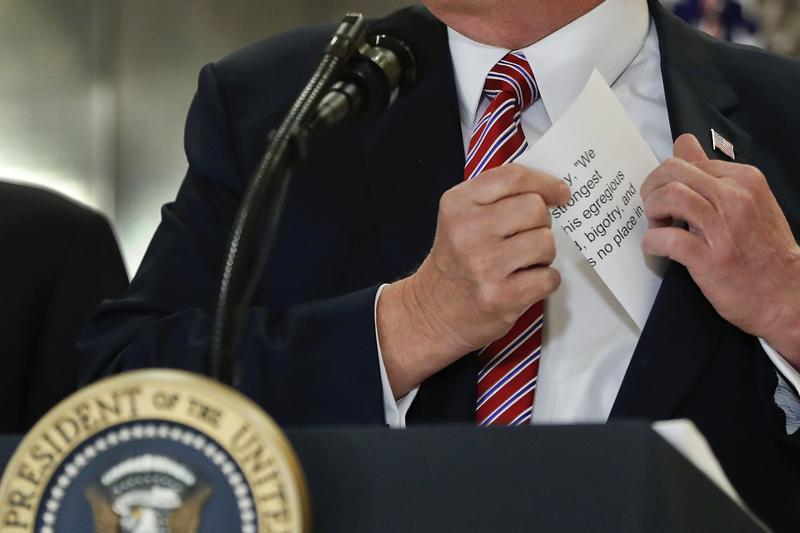
Over the course of his brief administration, President Trump has often handed people enemies to explain their anxieties. The result has sowed division on social issues that would ordinarily seem cut and dry. Case in point, a Harris Poll about Charlottesville, conducted on the night of August 15th, reveals that Americans are unhappy with how President Trump is handling the crisis but divided over where to place the blame.
The majority of Americans (54 percent) are either ‘not at all or not very satisfied' with how President Trump has responded to the Charlottesville protest. And 63 percent of Americans think The President should condemn white nationalists and other hate groups (among whites, 59% agree). And three-quarters of Americans believe the killing of Heather Heyer is an act of domestic terrorism.
It’s important to note, however, that people do not blame only white nationalists for Saturday's violence. Nearly half of all Americans (46 percent) believe both sides are to the blame for violence in Charlottesville (vs. 39 percent who blame the white nationalists alone), lending credence to President Trump’s assertions this week. And of those agreeing, 51 percent are ‘white’ and evenly distributed across the country: North East (38 percent), South (47 percent), Mid-West (49 percent) and West (48 percent).
This plays to a growing undercurrent of concern and anxiety about white identity in contemporary American society. On one hand, 64 percent of Americans disagree that ‘white people have fewer economic opportunities today than they did in 2000’. But when asked “Do you think city officials should honor monuments that celebrate The Civil War?” 49 percent agreed evenly across the country and support in the Northeast (46 percent) matched nearly with that of the South (49 percent) and was most pronounced in the Mid-West (54 percent). And 26 percent of Americans remain unsure, suggesting Trump’s slippery slope theory of 'who's next, Jefferson or Washington?' was an effective argument.
Despite these divisions, people are seeking answers (and even want responsibility) in solving our problems. The problem is they don’t count on our leadership to get us there. 90 percent of Americans feel that they are personally obligated to play a role in creating national unity. Yet 70 percent are not confident in the Trump administration’s ability to implement a solution that will help to unify the country, moving forward.
These results tell us that people are paying very close attention to Charlottesville and are not confident in the President's response. Amid growing tension and anxiety, Americans are seeking unity, but are upset by the violence of last weekend and unsure who to blame. Again, a manufactured enemy has Americans questioning its most basic values.
Methodology
This survey was conducted online within the United States by Harris Poll overnight August 15-16, 2017 among 1,219 U.S. adults ages 18 and older. Results were weighted where necessary to bring them into line with their actual proportions based on current census data. .All sample surveys and polls, whether or not they use probability sampling, are subject to multiple sources of error which are most often not possible to quantify or estimate, including sampling error, coverage error, error associated with nonresponse, error associated with question wording and response options, and post-survey weighting and adjustments. Therefore, the words “margin of error” are avoided as they are misleading. All that can be calculated are different possible sampling errors with different probabilities for pure, unweighted, random samples with 100% response rates. These are only theoretical because no published polls come close to this ideal. Respondents for this survey were selected from among those who have agreed to participate in our surveys. The data have been weighted to reflect the composition of the adult population, as stated above. Because the sample is based on those who agreed to participate in the online panel, no estimates of theoretical sampling error can be calculated.
